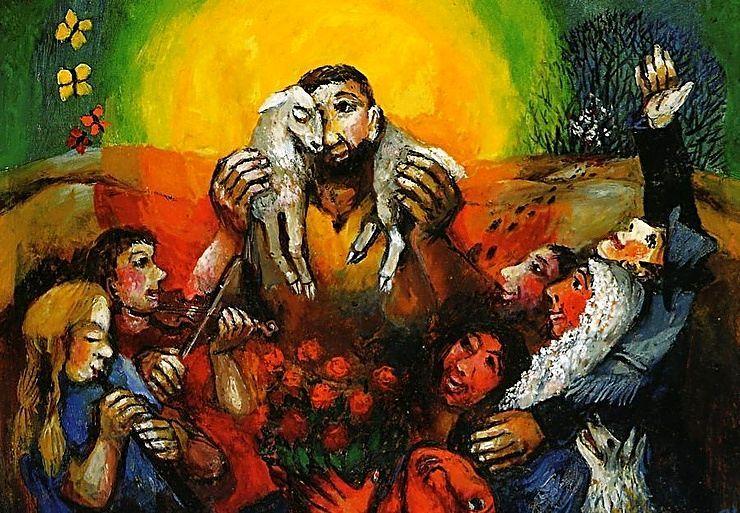Daniel Comboni
Comboni Missionaries
Institutional area
Other links
Newsletter
“What a terrible job to be a superior! But to serve the Lord we must carry our chains. We will be more free in paradise!” In its original context these words of Daniel Comboni (W 5815) refer to the concrete impossibility of spending a few days of holidays with his family in his hometown, as he would have liked, because he had to take care of his many commitments as head of the Institutes and of the mission of Central Africa.
Discernment
Reflecting on “The Comboni mission at the beginning of the third millennium,” the 16th General Chapter highlighted some paths that – next to the general norms of the Rule of Life 102-108 and 117-131 that still form our essential points of reference – make more concrete the role of the superior today and may, therefore, help us in our choice. Let us mention them here: “...the ministry of the superior is particularly valuable in animating fraternity, discernment and shared responsibility that make community life possible and meaningful.” (CA ’03, 81). “For effective co-responsibility, all the members of the community must be involved in the drawing up of a common project, and in planning and reviewing of commitments” (CA ’03, 93) “For greater quality and efficacy of missionary life, it is essential for the service of authority to be characterised by these elements: a community discernment, attention to the multicultural wealth of the community, the promotion of collaboration that guarantees both subsidiarity and shared responsibility.” (CA ’03, 99.5)
It is important to remember also what the General Chapter teaches us on continental coordination: “In the exercise of authority, shared responsibility and subsidiarity at all levels must continue to be encouraged. Each Continent will determine the concrete methods for carrying out the general principles.” (AC ’03, 137)
The key word of the Chapter, therefore, is “discernment.” In order to understand and then choose who will be more suited to guide our provinces for the next three years, we need the “discerning eyes” and, above all, “a generous heart” mentioned by Pope John Paul II (NMI, 58, quoted in CA ’03, 1).
Community discernment
It is obvious that such choice must emerge from a careful analysis and evaluation of the concrete situation of the province and of its needs. We understand, at the same time, that we are all affected by various conditionings and pressures, like a legitimate variety of opinions, personal likes/dislikes, alliances and strategies of provincial and national interest groups, etc. It is normal and prudent that the common good be sought keeping in mind also criteria of age, geographical and national representation. It is important, however, that such criteria are not considered the fundamental reasons and dynamics of our choices. We must help one another to ensure that the exchange of personal opinions, and also the consultations and preferences expressed in groups at assemblies during the process of discernment, be based on and be the fruit of the Spirit, resisting the temptation of prejudice or of special interest projects, while, in all sincerity, we search for “the will of God.”
Discernment in the Spirit
A true discernment can only be done in the Spirit. It is a gift to be humbly and repeatedly asked for in prayer, but also the fruit of a laborious personal and community process of reflection and of research in a spirit of faith. The process in which we are all asked to take part over the next few months, in fact, is not a mere juridical formality, an administrative deadline that will make a number of people happy and others unhappy, depending on the results. The process of election is a serious act of personal responsibility that will mark, for better or for worse, the future of our communities and provinces/delegations and, therefore, the mission to which we have given our lives, in the footsteps of Comboni.
May he be our guide, obtaining for us all the gift of the Spirit for a true personal, community and provincial discernment.
Choosing… servants
Nowadays, even in large commercial ventures, the ideal and effective manager, the new type of leader, is the person who knows how to be of service, an animator who listens, unites and stimulates others to reach a common goal. Therefore, it is not enough “to now how to give orders.” In essence, choosing a provincial means choosing a “servant” of the province and, with him, other confreres capable of advising and helping him to perform his duties as well as possible for the good of all. In the mind of the Chapter the superior is the “servant” called to be the animator of brotherhood, of discernment and of common responsibility for all. He is the promoter of the missionary spirit of the individuals, the communities and the province, so that each and everyone may be faithful to their Comboni missionary identity and vocation. His role, therefore, cannot be reduced to a type of more or less able and pain-free management of the status quo, not even touched by the birth of new projects and initiatives or by the courage of reshaping others. His primary duty consists in helping all the missionaries and the communities to grow in faithfulness to our Comboni missionary vocation as it takes shape in today’s world.
A “conditio sine qua non”
There are trees that bear fruit only in special environmental conditions. The service of authority is very delicate and complex, especially today. It only works in an appropriate environment, in a context of faith and communion. Obviously, this is true for those called to exercise this duty, but it is no less true for those in the community, province/delegation and Institute, who are called to follow the directives in a responsible manner. To elect superiors and ask them to accept this service for the good of all, and then leave them alone to carry the cross, or even worse, to overburden them with lack of cooperation or by refusing to give them a responsible and needed obedience, is not a serious and responsible behavior. It is rather the sure and tested way to undermine the good of the province/delegation. It is worth remembering this, in order to ensure that the exact opposite will happen.
Fr. Teresino Serra
Superior General
Reflecting on “The Comboni mission at the beginning of the third millennium,” the 16th General Chapter highlighted some paths that – next to the general norms of the Rule of Life 102-108 and 117-131 that still form our essential points of reference – make more concrete the role of the superior today and may, therefore, help us in our choice. Let us mention them here: “...the ministry of the superior is particularly valuable in animating fraternity, discernment and shared responsibility that make community life possible and meaningful.” (CA ’03, 81). “For effective co-responsibility, all the members of the community must be involved in the drawing up of a common project, and in planning and reviewing of commitments” (CA ’03, 93) “For greater quality and efficacy of missionary life, it is essential for the service of authority to be characterised by these elements: a community discernment, attention to the multicultural wealth of the community, the promotion of collaboration that guarantees both subsidiarity and shared responsibility.” (CA ’03, 99.5)
It is important to remember also what the General Chapter teaches us on continental coordination: “In the exercise of authority, shared responsibility and subsidiarity at all levels must continue to be encouraged. Each Continent will determine the concrete methods for carrying out the general principles.” (AC ’03, 137)
The key word of the Chapter, therefore, is “discernment.” In order to understand and then choose who will be more suited to guide our provinces for the next three years, we need the “discerning eyes” and, above all, “a generous heart” mentioned by Pope John Paul II (NMI, 58, quoted in CA ’03, 1).
Community discernment
It is obvious that such choice must emerge from a careful analysis and evaluation of the concrete situation of the province and of its needs. We understand, at the same time, that we are all affected by various conditionings and pressures, like a legitimate variety of opinions, personal likes/dislikes, alliances and strategies of provincial and national interest groups, etc. It is normal and prudent that the common good be sought keeping in mind also criteria of age, geographical and national representation. It is important, however, that such criteria are not considered the fundamental reasons and dynamics of our choices. We must help one another to ensure that the exchange of personal opinions, and also the consultations and preferences expressed in groups at assemblies during the process of discernment, be based on and be the fruit of the Spirit, resisting the temptation of prejudice or of special interest projects, while, in all sincerity, we search for “the will of God.”
Discernment in the Spirit
A true discernment can only be done in the Spirit. It is a gift to be humbly and repeatedly asked for in prayer, but also the fruit of a laborious personal and community process of reflection and of research in a spirit of faith. The process in which we are all asked to take part over the next few months, in fact, is not a mere juridical formality, an administrative deadline that will make a number of people happy and others unhappy, depending on the results. The process of election is a serious act of personal responsibility that will mark, for better or for worse, the future of our communities and provinces/delegations and, therefore, the mission to which we have given our lives, in the footsteps of Comboni.
May he be our guide, obtaining for us all the gift of the Spirit for a true personal, community and provincial discernment.
Choosing… servants
Nowadays, even in large commercial ventures, the ideal and effective manager, the new type of leader, is the person who knows how to be of service, an animator who listens, unites and stimulates others to reach a common goal. Therefore, it is not enough “to now how to give orders.” In essence, choosing a provincial means choosing a “servant” of the province and, with him, other confreres capable of advising and helping him to perform his duties as well as possible for the good of all. In the mind of the Chapter the superior is the “servant” called to be the animator of brotherhood, of discernment and of common responsibility for all. He is the promoter of the missionary spirit of the individuals, the communities and the province, so that each and everyone may be faithful to their Comboni missionary identity and vocation. His role, therefore, cannot be reduced to a type of more or less able and pain-free management of the status quo, not even touched by the birth of new projects and initiatives or by the courage of reshaping others. His primary duty consists in helping all the missionaries and the communities to grow in faithfulness to our Comboni missionary vocation as it takes shape in today’s world.
A “conditio sine qua non”
There are trees that bear fruit only in special environmental conditions. The service of authority is very delicate and complex, especially today. It only works in an appropriate environment, in a context of faith and communion. Obviously, this is true for those called to exercise this duty, but it is no less true for those in the community, province/delegation and Institute, who are called to follow the directives in a responsible manner. To elect superiors and ask them to accept this service for the good of all, and then leave them alone to carry the cross, or even worse, to overburden them with lack of cooperation or by refusing to give them a responsible and needed obedience, is not a serious and responsible behavior. It is rather the sure and tested way to undermine the good of the province/delegation. It is worth remembering this, in order to ensure that the exact opposite will happen.
Fr. Teresino Serra
Superior General




